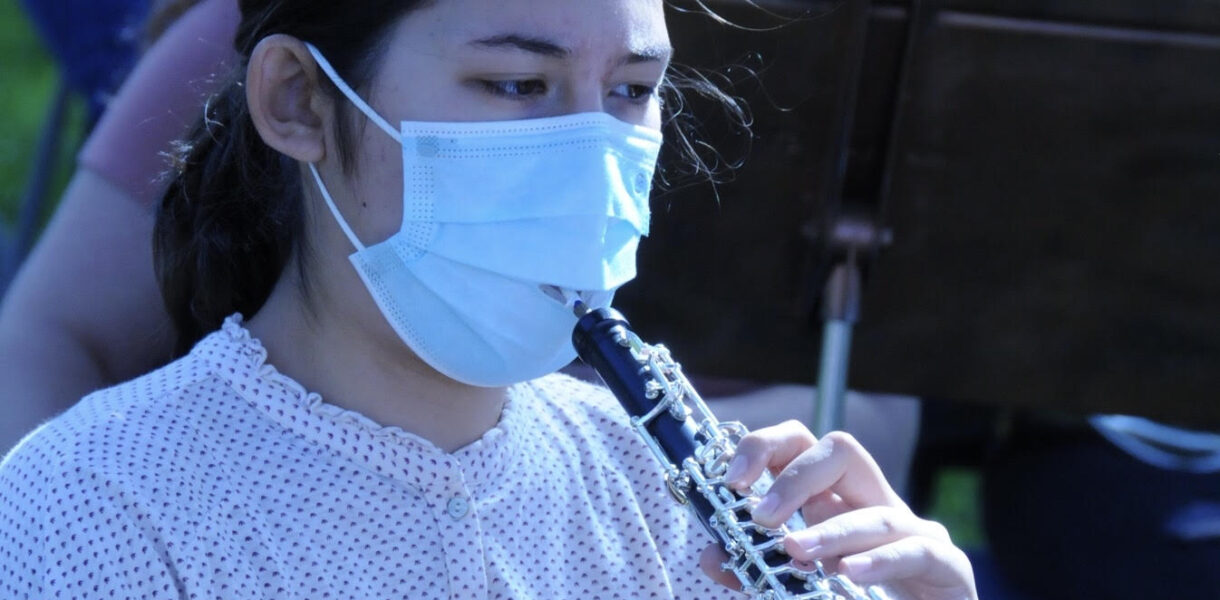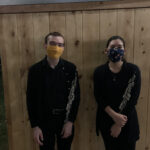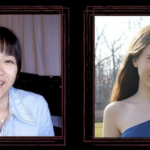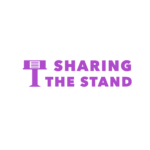I talked to multi-talented musician and music education major Katie Pierce about what it’s like to be a student of music education (you can find the article here). Now, we continue the conversation by talking about what diversity is in music, and how music educators like Katie are trying to open up the music field to make it more inclusive and welcoming.
So for those who want to go into music education, or music in general, I guess, what would you recommend for following that path?
The biggest thing for me has been you have to be ready to have your mind changed, about what you are expecting to do. Because a lot of people who I’ve come across, my colleagues here, came in wanting to do a specific thing. Like, in four years I’m going to go and teach high school band. And I know I want to do that. And a lot of people who come in here end up switching to be a music technology education major, and they go out and teach somewhere completely different, and they’re teaching maybe elementary general ed music, or they’re teaching middle school technology classes, or they’re flipping and they love choir. So be prepared to be open minded in that sense, that your path is not set, because we sample everything. Last semester, we took a class in music in adolescents, talking about middle school kids, and at the same time we took a class on music technology. And there are people I know who switched concentrations because they were going down one path and they loved that class and they changed. The other thing is, culturally. Our first music education class we take here is music 240, which is an intro course. And what they introduced to us there is the concept of culturally relevant teaching. And they point out to us, in that class, look around at your peers, at who is in this room, at who got to collegiate music, and look at the school that we’re in. What do you notice about it? It’s mostly white. And everyone looks mostly the same, and you’re here because you had a great experience. How can we make sure, you know, that we can start to diversify our field? Because a lot of teachers are white. And we’re trying to see why that’s the case, and understand that, then see what we can do to make that change. So we talk a lot about social issues, we talk a lot about educating everyone. I’m in a class right now, social foundations of music education, that’s talking about teaching diverse students, specifically Black and African American students, so I’m reading lots of literature on it and it’s fascinating. We have these case studies that we’re looking at every week, and we’re picking out, what did this teacher do, how did these affect the student long term. And these are very realistic things we are reading. It’s crazy because they could have happened! I’m sure some of the stuff I’m reading about has happened in our community, and I’m like, wow, that changes the course of a student’s trajectory, and we have to see the weight in that to make sure that we’re teaching the students in an equitable way. And that comes alongside knowing that you don’t know every culture, you know your culture. And your students know their culture. So we have to be humble enough, and we have to be good enough teachers to know that they’re the experts. And sometimes the kids and the students will be the experts on a topic. So if they come to us and they want to learn something, we let them be the expert, and we learn from them. In order to create that community of learners, we’ve got to also be learners. So that’s a lot of what we’re talking about here.
That’s so interesting! And I’m glad you’re talking about that in your college curriculum. Because obviously I’ve noticed the same thing too, there’s one demographic that we see, even down to the music we play is often by white men, and learning to teach to a different variety of people and working to diversify the field is super important. So, along those lines, there’s always talk of how music and the arts should be funded – nowadays, when you’re young, you’re exposed to sports and art and music and everything. How would you explain to someone who’s not a musician, the importance of having accessible music education?
There’s so many applications, since music is an interdisciplinary thing. It has a lot to do with history, since a lot of songs and composers have histories, and some of those histories can be really interesting and we can have discussion about those that are really interesting. I think above all, as I mentioned earlier, we’re giving students the opportunity to be part of a community. And that community is within the school day and they get to choose to be there. They’re learning a skill that, even if they put it down in a few years after they leave, whatever, middle school or high school, they’ll still going to remember those times. I know many people who have not continued with music from my grade when they graduated, and they still remember everything that happened. That’s a tough argument to make to someone who doesn’t understand what it’s like to be in music, and there’s dispute about whether or not the whole ‘music makes you smarter’ thing is true, but I feel like some of the applications like knowing some theory things or knowing certain pieces of music are going to help shape you as a person. Because I’ve known very few people who have not listened to music at all. So if you’ve listened to music, or you like some kind of music, there’s a place for you in music ed. I think that’s really important.
Yeah. And of course, we see you, you’re super dedicated and devoted becoming a music educator. But even if you didn’t follow that path, having the skills to dedicate yourself to something is very beneficial. So, since we’ve talked so much about your different experiences and through different fields, is there any piece or composer or even a living person you look up to as a musician, or as an educator, or any other reason?
I guess … we have great staff here. And one of my role models since my freshman year has been Dr. Elizabeth Peterson. She is one of the best conductors I’ve ever worked with. She makes the point in rehearsals, and I’ve only been with her one semester but it still sticks out, to point out things: “Music educators, look for this, See what I’m doing, music educators? I’m doing this for this reason.” And she points things out because she knows that we’re watching. She knows that she’s the example, and she is a great example. I mean, I think I’ve learned so much by just watching her conduct. So she’s definitely a role model. Mrs. Kessler [my high school band director] is still a role model to me. I text her from time to time, like on Friday we did our first conducting practice, and I texted her, “I did it today! I’m shaking like a leaf!” And she was like “I’m sure you were great!” So just having that line of communication still, and knowing that, and we also talk about the female band director thing! We see a lot of choir directors who are female, but when we get into the band world, it’s a lot more men, and it’s a lot more discriminatory. I’ve talked with Mrs. Kessler a lot about this, and she’s been a great role model, because she’s so successful and she’s done so much work, and all of it is her success, she’s earned it, she’s worked so hard for it. And I look up to that so much, I think that’s great. Composer-wise, I don’t know, I always tell people the first piece or one of the first band pieces I loved was Holst’s First Suite in E Flat, since that was my freshman/senior year piece, so I’m kind of a nerd about that piece. I’ve really gotten into some orchestra rep too, since we played it in high school! And it’s been great, and it’s fun to conduct too.
Yeah! Well, and what you say about females in the field, I spend more time in orchestra than band obviously since I don’t play a wind or brass instrument, but I think it’s applicable to that too. I think I’m lucky that I’ve had the experience to work with some women leaders in higher positions, but I don’t think a lot of people do! And now you’re going into music education, which is awesome, because like with you with Mrs. Kessler, someday someone will look up to in the same way! And it’s really powerful.
Last question, just to close off here. Is there any piece of music or genre of music that you think everyone who’s reading this should listen to?
Ah, I don’t want to say classical, because that’s so … not everyone likes that! I would say, if you haven’t heard jazz, you got to hear jazz. And if you haven’t heard jazz, a good place to start is with the old Ellington recordings. Those are mainly piano, so it’s not too distracting for people who get distracted while listening to music. Or if you want some of the big band stuff, Jazz at Lincoln Center Orchestra, they come out with stuff multiple times a year, and they’re great. They came out with a Sesame Street album I think this past year, in the fall I think? And that’s great if you’re looking for something goofier! They’ve also got a lot of guest artists that they record with, so I really love that. And I love listening to jazz still! I don’t get to play it anymore. That’s one of the only things that I really don’t like about being in this major and at this college because I just don’t have time for everything, and the thing that had to go was jazz.
Well, I’m sure you’ll come back to it someday. I haven’t listened to a ton of jazz, but as I play mainly classical music, I still find it’s so interesting and useful to hear, mostly the improv in jazz which we don’t see at all in classical – we can take so many things away from that!
Improvisation in itself is just an art!
Of course!
And I want to add one more thing to what I was saying about music ed and another thing that we’re trying to focus on here, and you might relate to this! In the classroom, a lot of big ensemble classes like band and orchestra and choir, there’s a lot of performance. So you’re having rehearsals, and that’s your class, it’s a rehearsal, and a lot of what we’ve talked about it is also, how can we get students creating, too? How can we get students composing, or writing their own songs, or writing lyrics, or learning how to put music to a visual? Or something like that. I think that’s a really interesting thing because talking about trying to be creative in an ensemble setting is something that I’m really interested in seeing where that goes! And I don’t know what your experiences have been like with creating, but I find it to be so freeing. And I love it.
Oh, it’s so cool! I haven’t had a ton of experience with formal composition, but just the idea that you have the power to make something that other people are going to hear in the same way that people still listen to pieces written hundreds of years ago, is so cool. And to continue to change the music landscape by introducing new works.
Exactly! You got it.
Thank you to Katie for taking the time to fill me in on her experiences and ideas. We need people to work in music education, in order to guide the future of music! Whether or not it will be a future career path, I hope that someone has been inspired and taken on a new view of music education through reading this interview. Today – take the chance to thank musicians in your life who you look up to!



